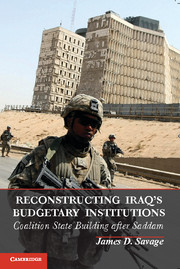Book contents
- Frontmatter
- Dedication
- Contents
- List of Tables
- List of Figures and Illustrations
- Preface
- Abbreviations
- 1 State Building and the Reconstruction of Iraq’s Budgetary Institutions
- 2 The Evolution of Iraqi Budgetary Institutions from the Ottomans and the British Mandate through Saddam
- 3 Prewar Planning for Iraq’s Economic and Budgetary Reconstruction
- 4 Boots on the Ground
- 5 Building Iraqi Ministerial Capacity
- 6 The 17th Benchmark and the Challenge of Iraqi Budget Execution
- 7 Building Iraqi Budgetary Capacity
- 8 Iraqi Budgeting
- 9 Successful State Building in Iraq?
- Bibliography
- Index
- References
7 - Building Iraqi Budgetary Capacity
Published online by Cambridge University Press: 05 June 2014
- Frontmatter
- Dedication
- Contents
- List of Tables
- List of Figures and Illustrations
- Preface
- Abbreviations
- 1 State Building and the Reconstruction of Iraq’s Budgetary Institutions
- 2 The Evolution of Iraqi Budgetary Institutions from the Ottomans and the British Mandate through Saddam
- 3 Prewar Planning for Iraq’s Economic and Budgetary Reconstruction
- 4 Boots on the Ground
- 5 Building Iraqi Ministerial Capacity
- 6 The 17th Benchmark and the Challenge of Iraqi Budget Execution
- 7 Building Iraqi Budgetary Capacity
- 8 Iraqi Budgeting
- 9 Successful State Building in Iraq?
- Bibliography
- Index
- References
Summary
The 17th Benchmark’s focus on budget execution expanded Coalition budgetary state building beyond the ministries of Finance and Planning to much of the Iraqi government. Whereas the responsibility for formulating the budget resided primarily in these two financial ministries, the task of spending the investment budget involved virtually the entire administrative apparatus. Successful investment budget execution required planning, contracting, procurement, and capital project management skills throughout the bureaucracy, particularly in those ministries with large capital budgets. After de-Ba’athification, sectarian purging of ministries, years of violence, and the exodus of much of the civil service from Iraq, the government simply lacked the necessary personnel to engage in the dramatic turnabout in capital spending demanded by the Benchmark. To build this administrative capacity the Coalition and several key donors initiated broadly based and targeted capacity development programs to train the Iraqi civil service at the ministerial and provincial levels. Over time, the Coalition extended its budgetary technical assistance to Iraq’s Parliament, the Council of Representatives. These training programs encountered the challenges familiar to capacity-building efforts, including the struggle to develop cohesive technical assistance that reflected shared goals, coordinate training efforts among participants, overcome resistance and gain beneficiary buy-in and ownership, and measure and evaluate the effectiveness of this assistance. These attempts to layer new institutions and administrative practices reflect the difficulties of achieving institutional change in Iraq. This chapter examines these Coalition efforts at building budgetary capacity throughout the Iraqi government.
- Type
- Chapter
- Information
- Reconstructing Iraq's Budgetary InstitutionsCoalition State Building after Saddam, pp. 172 - 207Publisher: Cambridge University PressPrint publication year: 2013



